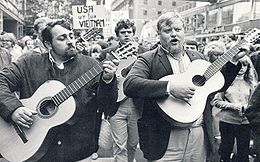The U.S. got involved in Vietnam after WWII in 1959 to 1973 because of the “Red Scare” and the “Containment Policy”. Vietnam is a southeast Asian country that was colonized by the French in 1884. After World War I with the mandate system President Wilson and then later F.D.R both declined pleas from both Vietnam and France to help out in their effort to recolonize. As the Cold War started in the 1950s America began to value a policy of Democratic containment of the spread of communism. President Eisenhower sent America advisers to Democratic South Vietnam in their civil war against the north as part of his “domino theory” strategy.
It wasn’t until 1961 when the first U.S. troops were sent to Vietnam by president Kennedy. We got involved in Vietnam to try to contain communism in Asia. Americans were scared that communism would become the new world power. The commitment to defend South Vietnam was reaffirmed by Kennedy on May 11, 1961 in National Security Action Memorandum 52, which became known as “The Presidential Program for Vietnam”.
Its opening statement reads: “U.S. objectives and concept of operations are to prevent communist domination of South Vietnam; to create in that country a viable and increasingly democratic society, and to initiate, on an accelerated basis, a series of mutually supporting actions of a military, political, economic, psychological, and covert character designed to achieve this objective.”
Back on the home front as the war dragged on into the early 1970s there were riots and protests from young people across the nation. They were the ones being drafted. 648,500 total people were drafted for Vietnam. Of which almost 18,000 died. The average age of those Americans killed was 19. This led to the tragedy at Kent State University. In which 9 students were injured and 4 were killed when the National Guard was sent to the campus to contain the protest and opened fired into the crowd of students. Between 1963 and 1973, 9,118 men were prosecuted for refusing to be drafted into the army. The most famous of these was Muhammad Ali, the world heavyweight boxing champion.
By 1968, the Vietnam War was costing 66 million dollars a day. By May, 1971 only 28% of Americans supported American involvement in Vietnam. Protest to American participation in the Vietnam War was a movement that many popular musicians appropriated, these musicians included Joni Mitchell, Joan Baez, Phil Ochs, Lou Harrison, Gail Kubik, William Mayer, Elie Siegmeister, Robert Fink, David Noon, Richard Wernick, and John W. Downey. The two biggest musicians that influenced Americans to oppose the war were Jimi Hendrix & Bob Dylan. On January 27, 1973, the parties agreed to a cease-fire the following day, the withdrawal of all U.S. forces, the release of all prisoners of war, and the creation of an international force to keep the peace.


